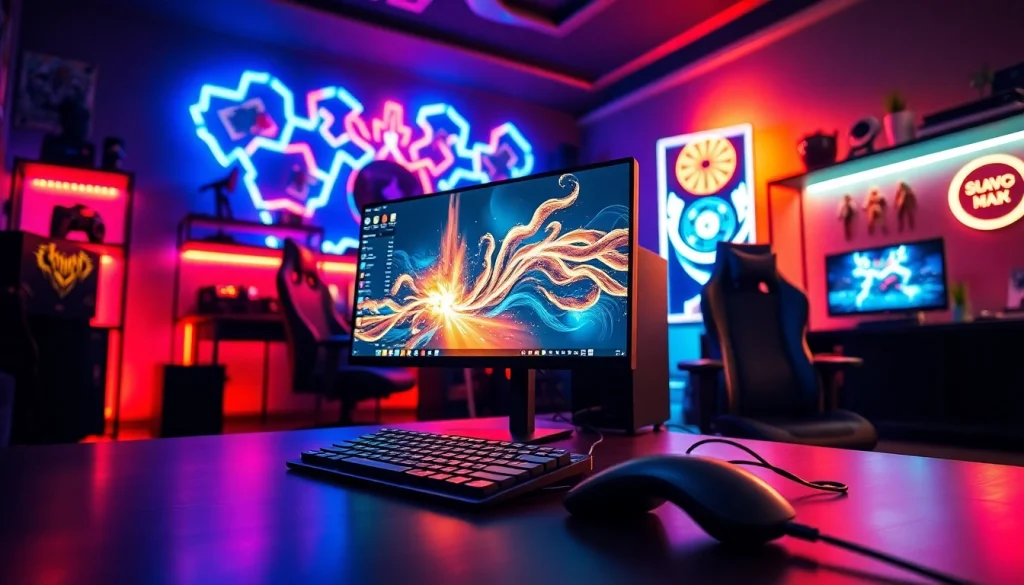Understanding the Essentials of Gaming Computer Components
In the fast-paced world of gaming, having a powerful and efficient system is crucial for an immersive experience. A well-constructed Gaming Computer can significantly enhance performance, graphics quality, and overall gameplay. Let’s delve into the essential components that make up a high-performance gaming rig.
Key Hardware Components for Gaming Computer
A gaming computer is not just any regular PC; it is a carefully assembled machine designed with high-performance hardware. Here are the key components:
- Graphics Processing Unit (GPU): This is arguably the most crucial part, responsible for rendering images, animations, and video for the computer’s display.
- Central Processing Unit (CPU): Often referred to as the brain of the computer, the CPU handles all the main processing and calculations for games and applications.
- Random Access Memory (RAM): RAM is essential for multitasking during gameplay, allowing the computer to run multiple applications without slowing down the system.
- Storage Options: Solid State Drives (SSD) and Hard Disk Drives (HDD) provide storage for games, applications, and files. SSDs offer faster loading times compared to traditional HDDs.
- Motherboard: This component connects all the parts of the computer, facilitating communication between the CPU, GPU, RAM, and storage devices.
- Power Supply Unit (PSU): The PSU provides power to all components, ensuring that they operate smoothly and reliably.
- Cooling System: Effective cooling solutions are vital as gaming components generate significant heat during operations.
Importance of Graphics Cards in Gaming Computer Performance
The graphics card, or GPU, is perhaps the most critical component for a gaming computer. It determines the quality of graphics rendered and affects the overall frame rates in games. A powerful GPU allows for higher resolutions, better textures, and more realistic graphic effects, which are essential for modern gaming.
Investing in a high-end graphics card can vastly improve your gaming experience, ensuring you can play the latest titles at smooth frame rates while enjoying detailed graphics. Moreover, advanced technologies such as real-time ray tracing can add a new dimension of realism to visuals, enhancing immersion.
Selecting the Right Processor for Your Gaming Computer
The CPU also plays a critical role in your gaming experience. It influences not only the gaming performance but also the computer’s ability to multitask. When selecting a CPU for your gaming computer, consider factors like:
- Core Count: More cores can handle more tasks simultaneously, improving overall performance.
- Clock Speed: Higher clock speeds generally mean better performance, especially in single-threaded games.
- Compatibility: Ensure the CPU is compatible with your motherboard and that it has sufficient cooling capability.
Choosing the right processor can mean the difference between lag-free gameplay and frustrating slowdowns. Researching benchmarks for your preferred games can help you make an informed decision.
Building vs. Buying Your Gaming Computer
When it comes to acquiring a gaming computer, you typically have two primary options: building your own machine or purchasing a pre-built system. Both choices come with distinct advantages and drawbacks.
DIY: Steps to Build Your Own Gaming Computer
Building your own gaming computer can be a rewarding experience that allows for customization and often cost savings. Here’s a step-by-step guide to get started:
- Determine Your Budget: Outline how much you are willing to spend on your components.
- Research Components: Choose compatible parts based on your gaming needs. Use online resources and forums for guidance.
- Purchase Parts: Buy the selected components from reliable retailers.
- Assemble the Computer: Follow detailed tutorials to assemble your components safely and correctly.
- Install the Operating System: After assembly, install your preferred operating system and necessary drivers.
- Optimize Settings: Tweak settings for performance according to your needs.
Building your gaming computer allows for personal touches, such as custom aesthetics or specific performance tweaks.
Pros and Cons of Buying Pre-Built Gaming Computer
While building your gaming computer can be fun, buying pre-built systems offers its own set of advantages:
- Convenience: Pre-built systems are ready to go right out of the box, saving time.
- Support: They often come with customer support and warranties, providing peace of mind.
- Compatibility: All components are tested for compatibility, reducing the risk of hardware issues.
On the flip side, pre-built systems limit customization options and often come at a premium compared to building your own.
Budget Considerations for Gaming Computer Options
Your budget will significantly influence your decision on whether to build or buy a gaming computer. Setting a clear budget helps you make informed choices about components or systems that meet your performance needs. Generally, consider the following budget tiers:
- Entry-Level: Great for casual gamers who play less demanding titles. Expect to spend on moderate-end components.
- Mid-Range: Suitable for most modern games at high settings. Incorporating solid GPUs and CPUs for excellent performance is recommended.
- High-End: Ideal for enthusiasts who demand the latest and greatest graphics and processing capabilities for intensive gaming.
Balancing performance with budget considerations is essential to get the most value out of your gaming computer.
Optimizing Your Gaming Computer for Performance
Once you have your gaming computer set up, optimizing it for performance is crucial. Several settings and tools can help enhance efficiency and gameplay experience.
Essential Software for Enhancing Gaming Computer Efficiency
Utilizing the right software solutions can significantly boost your gaming computer’s efficiency. Some essential types of software include:
- System Monitoring Tools: Applications like MSI Afterburner can help you keep track of CPU and GPU temperatures and usage.
- Performance Optimization Software: Tools designed to free up system resources can improve performance, such as CCleaner to manage unneeded files.
- Game Launchers: Using dedicated game launchers allows for better optimization of game settings based on your hardware.
Keeping your software updated will also ensure smooth operation and optimal performance.
Cooling Solutions for Your Gaming Computer
Thermal management is essential for maintaining the longevity and performance of your gaming computer. Overheating can lead to throttling or damage. Here are some effective cooling solutions:
- Air Cooling: High-quality air coolers can run efficiently to dissipate heat effectively.
- Liquid Cooling: For high-performance systems, liquid cooling offers superior heat management.
- Case Fans: Ensure adequate airflow within your case to keep temperatures down.
Implementing a suitable cooling solution tailored to your components will enhance performance under load, especially during intensive gaming sessions.
Upgrading Components of Your Gaming Computer
As gaming technology evolves, regular upgrades are essential to keep your gaming computer competitive. Prioritize the following components for upgrades when needed:
- GPU: As graphics technology advances, upgrading your GPU can significantly enhance visual fidelity and framerates.
- RAM: Increasing RAM can help with multitasking and improve overall performance in demanding titles.
- Storage: Moving to a larger or faster SSD can reduce load times and improve comfort, especially in open-world games.
Understanding when and how to upgrade parts of your gaming computer is vital for maintaining performance and adapting to new gaming demands.
Gaming Computer Accessories That Enhance Playability
Beyond the core components, numerous accessories can improve the overall gaming experience. From peripherals to enhancement devices, these accessories play a pivotal role.
Must-Have Devices for Your Gaming Computer Setup
The right peripherals can greatly enhance your gaming experience. Key accessories include:
- Gaming Mouse: A responsive, ergonomic gaming mouse can significantly improve gameplay efficiency.
- Gaming Keyboards: Mechanical keyboards can offer better feedback and responsiveness than standard keyboards.
- Headsets: Quality gaming headsets ensure immersive audio experiences and effective communication in multiplayer scenarios.
- Monitors: High-refresh-rate monitors with low response times can improve visual quality and responsiveness during gameplay.
Investing in quality peripherals can lead to better performance and enjoyment during gaming sessions.
Ergonomics and Comfort in Gaming Computer Accessories
Comfort is essential, particularly during long gaming sessions. Consider ergonomic designs for your accessories. Items to consider include:
- Ergonomic Chairs: Proper back support can reduce discomfort significantly.
- Adjustable Desks: Standing desks allow for more flexibility in working and gaming positions.
- Wrist Rests: Adding wrist rests for keyboards and mice helps promote better posture.
Ergonomic accessories not only enhance comfort but also prevent long-term injury from prolonged use.
Visual and Audio Upgrades for Your Gaming Computer Experience
Enhancing the visual and audio elements of your gaming setup can lead to a more immersive experience. Consider investing in:
- High Definition Monitors: Upgrading to 4K displays can enhance detail and realism in games.
- Surround Sound Systems: These systems create a more engaging audio environment.
- Monitor Calibration Tools: Tools to adjust display settings for optimal color accuracy and consistency.
Improving visual and audio quality can significantly enrich your overall gaming experience.
Future Trends in Gaming Computer Technology
The gaming industry is in constant evolution, driven by technological advancements. Staying informed about future trends can guide your purchasing and upgrading decisions.
Impact of VR on Gaming Computer Development
Virtual Reality is reshaping how games are created and played. As VR technology advances, gaming computers must adapt to meet the higher performance standards required for smooth VR experiences. A gaming computer capable of running VR applications typically needs:
- High-End GPUs: To render VR environments with minimal latency.
- Low Latency: Essential for preventing motion sickness and ensuring a pleasant experience.
- Powerful CPUs: To handle the extensive calculations necessary for VR environments.
With the rising popularity of VR, investing in a capable gaming computer is likely to remain essential for an optimal gaming experience.
Upcoming Hardware Innovations for Gaming Computer
The gaming sector frequently launches hardware innovations, from GPUs to CPUs. Upcoming trends include:
- Increased Performance: Next-generation GPUs will likely provide boosts in performance, efficiency, and processing capabilities.
- AI Integration: AI is expected to enhance gaming experiences, from better graphics to adaptive gameplay.
- Sustainability: More manufacturers are focusing on creating power-efficient components, reducing resource usage.
Staying ahead of these trends ensures your gaming computer can remain relevant and capable of handling new technologies.
The Rise of Cloud Gaming and Its Effects on Gaming Computer
Cloud gaming is emerging as a viable alternative to traditional gaming setups, where computational power is offloaded to remote servers. This development has several implications for gaming computers. Advantages include:
- Less Hardware Dependence: Gamers can access high-quality gaming experiences without needing top-end components.
- Accessibility: Players can game on different devices, broadening gaming access.
- Quick Updates: Cloud platforms can roll out updates and new games without the need for downloads.
As cloud gaming technologies develop, it may reshape the traditional gaming landscape, affecting how we think about gaming hardware.


